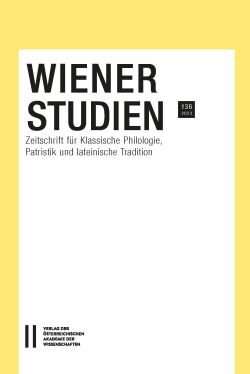
Wiener Studien 136/2023, pp. 99-122, 2023/07/11
Zeitschrift für Klassische Philologie, Patristik und lateinische Tradition
The text of a vexed passage in Plautus’ Persa, Saturio’s laudatio to his parasitic ancestors (vv. 53–64), variously emended by editors, is first established paleographically after examining the manuscript tradition. Next, Saturio’s expression duri capitones is explained as a calque of νήστιδες κεστρεῖς “fasting mullets” – a proverbial expression in Greek for starving parasites often found in New Comedy. It is argued that the joke survives translation into Latin only because alternate connotations are recruited to facilitate the creation of a pun on the Roman cognomen Capito. Alternately, the expression duri capitones is interpreted as a word play on caput durum, a phrase synonymous with impudens, which enables Saturio to differentiate himself from other parasite-types, especially from the quadruplator who represents in the Roman context the comic stock character of the sycophanta.